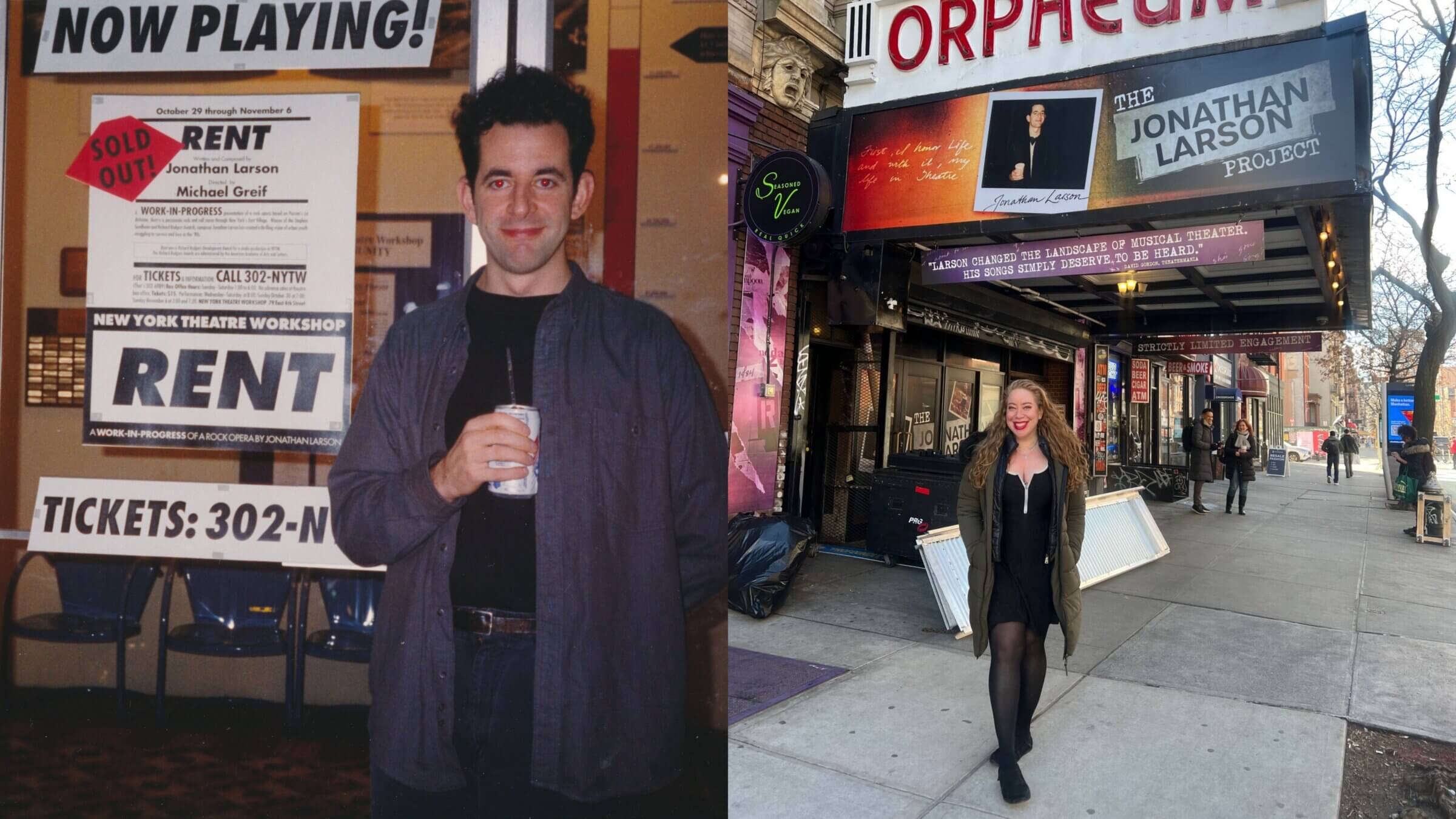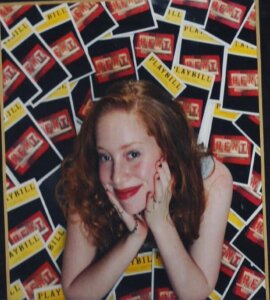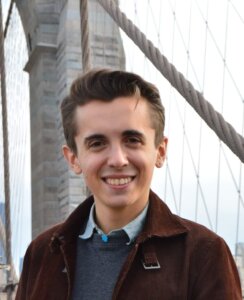Jonathan Larson died before becoming a Broadway legend. This Jewish ‘RENT’-head feels obliged to continue the work.
‘The Jonathan Larson Project,’ a new revue conceived by Jennifer Ashley Tepper, features Larson’s unpublished songs.

Left: Shortly before his death, Jonathan Larson stands outside the New York Theater Workshop before the opening of RENT. Right: Nearly 35 years later, theater historian Jennifer Ashley Tepper is bringing Larson’s posthumously published songs to life in The Jonathan Larson Project at the Orpheum Theater. Courtesy of The Jonathan Larson Project
At the Orpheum Theater in Manhattan’s East Village, playwright Jonathan Larson is having a third act.
The Jonathan Larson Project is the third full-length Larson show to be performed on a New York City stage. His first, Tick…Tick…Boom, was a semi-autobiographical story of a struggling musical theater composer in Manhattan that premiered off-Broadway in 1990. Then there was RENT, a smash hit about a group of Alphabet City bohemians that broke barriers in terms of Broadway representation and ran for over a decade.
Only, Larson died at age 35 of an aortic dissection during the first day of previews for RENT. He never lived to see his work reach mass commercial success, nor to see it develop a devoted cult following. But Jennifer Ashley Tepper, a theater historian and an unapologetic “RENT-Head” herself, is working to keep Larson’s legacy alive in 2025 through a new song cycle.
“I was so obsessed with RENT around the time of my bat mitzvah,” said Tepper, speaking on Zoom during a rehearsal. “On my bat mitzvah sign-in board, I’m dressed up as Mimi popping out of a pile of RENT playbills.”

Using cassettes, scripts and journal scribblings collected from Larson’s apartment and stored at the Library of Congress, Tepper assembled the skeleton material of The Jonathan Larson Project. She has been working on the revue for 11 years, while also working as a director at the 54 Below cabaret club.
The show, which started previews last week, features Broadway veterans like Lauren Marcus, Taylor Imam Jones and Adam Chanler-Berat belting out 20 of Larson’s previously unpublished songs.
In an essay she wrote for Broadway World, Tepper shared that some of Larson’s songs were written for cabarets during Larson’s college days or right after moving to New York; others were for projects that never panned out, like Larson’s adaptation of George Orwell’s 1984. Tepper had access to the raw material thanks to the library, but she had to do the digging and dramaturgy to figure out how these drafts would all fit together.
“It’s the song cycle that Jonathan Larson never got to create, but that he might have,” Tepper said.
Jewish actions speak louder than words
Larson was born to a Jewish family in White Plains, New York, and he was raised in a liberal, middle-class home. His grandfather immigrated from Russia in the early 20th century, changing the family’s last name from Lazarson to Larson. In high school, he played Tevye in Fiddler on the Roof.
In Larson’s work, Judaism may not take center-stage, but it’s definitely part of the ensemble. In Tick…Tick…Boom, there is a subtle nod to protagonist Johnny’s Jewish identity. While working as a waiter at a diner to make ends meet, he mutters “challah” at a pair of clueless patrons. In Rent, the character Mark Cohen — another tortured artist type loosely modeled after Larson — makes jokes about tangoing at JCCs and kvetches about his overbearing Jewish mother.
But Tepper says that the Jewish themes in Larson’s work are richer than scattered pieces of self-deprecating Yiddishkeit.

“ Some of the material in The Jonathan Larson Project is about social justice and is explicitly political and very much fighting for the rights of people that are underrepresented in the same way that Jonathan did in Rent,” Tepper told me. “To me, that feels very Jewish.”
For example, “Iron Mike” was written in response to the Exxon Valdez Oil Spill, the largest oil spill in U.S. history, and it was first performed at a 1990 Earth Day cabaret. Another song, “White Male World,” takes a jab at the hierarchies of power that keep white men up on top.
“Social justice is so important culturally to Judaism,” said Tepper. “He was moving things forward the best as he could in his time,” she added, referring to how Larson’s work often tackled class, poverty and the HIV/AIDS Crisis. She invoked Rabbi Tarfon’s famous quote: “You are not obliged to finish the work but neither are you free to desist from it.”
“He didn’t abandon it,” said Tepper, referring to both Larson’s music and his activism “But neither did we. We’re just pushing it forward in our own time.”
Will I lose my dignity? Will someone care?
When Stephen Sondheim’s Here We Are premiered at The Shed in 2023, critics debated whether Sondheim — a mentor of Larson’s, and a known perfectionist — truly had creative say in the play’s production. After Leonard Cohen died, his last album, Thanks For The Dance, was produced and released by his son in 2019. What are the ethics of publishing someone else’s work after they’ve died?
For Tepper, having Larson’s family involved in the production eased some of the ethical considerations of posthumous publishing. “Julie Larson, Jonathan’s sister, has been instrumental to the whole process,” Tepper said. According to Tepper, she worked with the Larson estate and individual family members to ensure her project respected Jonathan’s intentions in his songs.
“They’ve really put a level of trust in us and they’ve let us do it,” Tepper said.
Speaking over the phone from California, Julie Larson shared that she was happy with how the show turned out, and she credited Tepper’s enthusiasm and passion in spearheading the project. “We gave her permission to sort of run it with it, and they did a lovely job,” Julie said. “We always felt like we were in completely good hands with Jen and the phenomenal young cast.”
Julie flew into New York to see the show during its first preview last Friday. Because Julie lived on the west coast, Jonathan would sometimes call her to play her a demo of a song he was working on, long after his New York friends had gone to sleep. Julie said that seeing some of those songs come to life on stage brought back a “platter combo of emotions.”
“I remember when he sent me that tape, how excited he was about that song, that sort of thing,” Julie said.

525,600 life lessons
Tepper said she hopes audiences will take away from The Jonathan Larson Project deeper knowledge about Larson’s musical prowess — the composer blended rock, pop and traditional piano melodies in his rock operas in ways previously unheard in musical theater. Tepper also said she hoped audiences walked away with a greater appreciation for Larson’s broader life advice.
“ Jonathan Larson is reaching through time to kind of hold our hand and tell us, like, this is how we fight the system, or this is how you get through a time that you might be struggling, or this is how to deal with loss,” Tepper said.
Tepper quoted one of her actors, Adam Chanler-Baret, who she believed put it best: “Our show is a survival guide for difficult times.”
A message from our Publisher & CEO Rachel Fishman Feddersen

I hope you appreciated this article. Before you go, I’d like to ask you to please support the Forward’s award-winning, nonprofit journalism so that we can be prepared for whatever news 2025 brings.
At a time when other newsrooms are closing or cutting back, the Forward has removed its paywall and invested additional resources to report on the ground from Israel and around the U.S. on the impact of the war, rising antisemitism and polarized discourse.
Readers like you make it all possible. Support our work by becoming a Forward Member and connect with our journalism and your community.
— Rachel Fishman Feddersen, Publisher and CEO





























